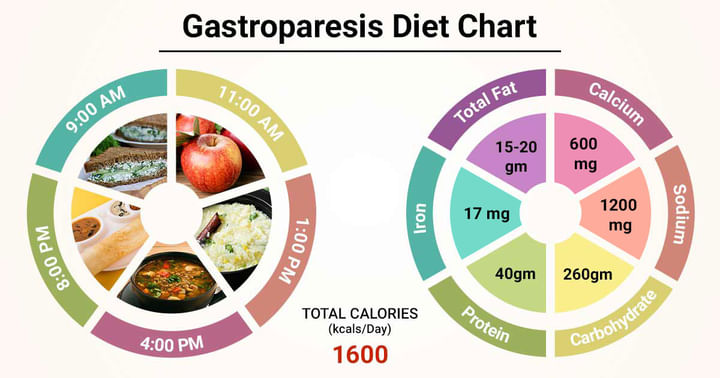Get the App
For Doctors
Login/Sign-up
About
Health Feed
Find Doctors
Diet Chart For gastroparesis
Last Updated: Jan 20, 2025
About
A gastroparesis diet helps keep nausea, abdominal pain and reflux at a minimum. Gastroparesis is a condition wherein the emptying of the stomach does not take place at appropriate times and is delayed. Being full, therefore, causes vomiting to alleviate pressure from the stomach. To tackle the disease, eating six small meals throughout the day is recommended rather than eating three big ones. This method of ‘grazing’ never allows the stomach to be completely satiated. Foods that are simpler to digest such as yogurt, well-cooked vegetables or any kind of purees are recommended for a gastroparesis diet. Chewing food well before swallowing is also helpful. Fiber intake should be kept to a minimum. Cereals, whole grains, and lentils are to be eaten in moderation.
Fatty foods in the solid form are the hardest to digest. To quell the body’s daily need for fats, smoothies are good substitutes for burgers or fries. From the poultry department, eggs are the easiest to digest and can be cooked in multiple ways to provide variety. Cottage cheese (paneer) and curd can also be included in the diet. Any forms of fluids, be it water or juice, reduce the strain on the stomach. A gradual shift from a fluid-centric diet to a more wholesome diet is most beneficial when dealing with gastroparesis.
Diet Chart
| Sunday | |
| Breakfast (8:00-8:30AM) | Milk beread sandwich with apple sauce (4 slice brad) |
| Mid-Meal (11:00-11:30AM) | Apple/Grape/Pineapple/Cranberry, juice |
| Lunch (2:00-2:30PM) | Moong dal Khichdi 1 cup |
| Evening (4:00-4:30PM) | Mix Lentil soup 1 cup |
| Dinner (8:00-8:30PM) | White rice dosa 2+ ladies finger subji 1/2 cup |
| Monday | |
| Breakfast (8:00-8:30AM) | Iddli 3+ Ground greens chutney+ Poached egg 1 |
| Mid-Meal (11:00-11:30AM) | Apple/Grape/Pineapple/Cranberry, juice |
| Lunch (2:00-2:30PM) | Curd rice 1 cup |
| Evening (4:00-4:30PM) | Spinach soup 1 cup |
| Dinner (8:00-8:30PM) | Tomato khichdi 1 cup |
| Tuesday | |
| Breakfast (8:00-8:30AM) | Rice dosa 3+ Tomato chutney without seed |
| Mid-Meal (11:00-11:30AM) | Apple/Grape/Pineapple/Cranberry, juice |
| Lunch (2:00-2:30PM) | Tomato rice 1 cup+ scrambled egg |
| Evening (4:00-4:30PM) | Buttermilk 1 glass |
| Dinner (8:00-8:30PM) | Iddli 3+ Tomato chutney |
| Wednesday | |
| Breakfast (8:00-8:30AM) | Banana pancake+ 1 glass apple juice. |
| Mid-Meal (11:00-11:30AM) | Apple/Grape/Pineapple/Cranberry, juice |
| Lunch (2:00-2:30PM) | Palak Khichdi 1 cup |
| Evening (4:00-4:30PM) | Mix Lentil soup 1 cup |
| Dinner (8:00-8:30PM) | Boilled rice+ ashguard curry |
| Thursday | |
| Breakfast (8:00-8:30AM) | White riceflakes poha+ 1/2 cup skim milk. |
| Mid-Meal (11:00-11:30AM) | Apple/Grape/Pineapple/Cranberry, juice |
| Lunch (2:00-2:30PM) | boiled rice+ mashed dal curry |
| Evening (4:00-4:30PM) | Beetroot+ carrot soup 1 cup |
| Dinner (8:00-8:30PM) | Iddli 3+ mashed beetroot subji 1/2 cup |
| Friday | |
| Breakfast (8:00-8:30AM) | Iddli 3+ Ground greens chutney. |
| Mid-Meal (11:00-11:30AM) | Apple/Grape/Pineapple/Cranberry, juice |
| Lunch (2:00-2:30PM) | Chicken Khichdi 1 cup. |
| Evening (4:00-4:30PM) | veg soup 1 cup |
| Dinner (8:00-8:30PM) | White rice dosa 2+ cluster beans subji 1/2 cup |
| Saturday | |
| Breakfast (8:00-8:30AM) | Cornflakes+ Skim milk 1 cup. |
| Mid-Meal (11:00-11:30AM) | Apple/Grape/Pineapple/Cranberry, juice |
| Lunch (2:00-2:30PM) | Curd rice 1 cup |
| Evening (4:00-4:30PM) | Mushroom soup 1 cup. |
| Dinner (8:00-8:30PM) | Moong dal Khichdi 1 cup |
Food Items To Limit
- Coffee and/or tea- Caffeine content which leads to GERD.
- Spicy food- Spices and 'masalas' as we call it, are always proved to be an irritating agent and many a times the cause for gastric irritation.
- Alcohol- It not only adds empty calories to the body but also worsens the condition by excessive fermentation of sugar present in it as a result excess acid production in the stomach in combination of others ligitimate conditions may lead to gastric ulcers.
- Acidic foods, such as citrus and tomatoes- The higher the acidic content of the foods the more probability of excess acidic evironment inside the stomach and so gastric ulcers.
- Raw vegetables/ salads- have to be avoided as they may cause irritation of mucosa and there are cahnces of H.pylori infection.
- High fibre diet- it may erode/ irritate the mucosa due to its rough texture.
Do's And Dont's
Do's:
- Being overworked and overstressed are like extending a direct invitation to gastric problems. The body loses its ability to perform normal digestive functions and is often associated with increased production of stomach acids.
- Having 5 small easily digestible meals a day at proper intervals is a key to good digestive health. Eating slowly without talking and chewing the food properly also improves digestion. It reduces intestinal gas as less air is swallowed during the eating process.
- Emotional eating too causes such disorders. So it is very important to fix any so called underlying reasons, be it psychological or emotional to make a complete recovery from the said condition.
- A prerequisite in order to achieve a healthy digestive process is an efficiently hydrated body. Drinking 8-10 glasses of water every day is mandatory to prevent any gastric complications. Drinking 2-3 glasses of luke warm water first thing in the morning is said to help with regular bowel movements and relieve indigestion and flatulence.
- There are a lot of food items which go a long way in maintaining a healthy digestive tract. Probiotics are the friendly bacteria of the gut. They help in breaking down the food and making it easy for the body to digest it. Fermented milk products like yogurt contain the bacteria lactobacillus which is known to promote digestion. Non glutenous grains, non citric fruits and vegetables, high fiber and lean protein meats are the best choices.
Don'ts:
- Avoiding foods like complex carbohydrate and proteins (difficult to be broken down) following a gastric attack would be a good idea.
- Avoiding alcohol and smoking is absolutely essential to recover from a gastric attack. Prolonged intake of these could cause irrepairable damage to the gut.
- Staying away from certain medications like acetaminophens, analgesics, ibuprofen, non steroidal anti inflammatory drugs is important in preventing gastritis.
- Caffeinated beverages like sodas, tea and coffee should be taken in a controlled portion. Keeping away from wheat, tomatoes, lemons, red meat etc is essential.
- Staying away from dairy is also recommended in gastritis. Anything hot and spicy like peppers, black pepper or red chili powder should be kept away from. These have a history of causing irritation in the gastric lining. Vegetables like cabbage, broccoli, brussel sprouts, beans are tougher on the gut and should be stayed away from.
Food Items You Can Easily Consume
- Cereals & Pulses: Cereals (rice, oats, jowar, bajra and ragi) and pulses (red gram, green gram, bengal gram and black gram dals)(properly cooked).
- Fruits & vegetables: Fruits (stewed apple, banana, papaya, pomegranate, pear, melons (water melon, musk melon) and vegetables (all gourds, ladies finger, tinda, green leafy vegetables (indian spinach, fenugreek leaves, corriander leaves).
- Meat, Fish & Poultry: Lean meat, skin less chicken, fish (mackerel, trout, sardine, salmon, tuna).
- Milk & Milk products: Yoghurt, other fermented milk products. Nuts & Oils: Almonds, walnuts, pista, olive oil, Sunflower oil, Saff flower oil, rice bran oil.
References
- Camilleri M. Novel diet, drugs, and gastric interventions for gastroparesis. Clinical Gastroenterology and Hepatology. 2016 Aug 1;14(8):1072-80. [Cited 01 July 2019]. Available from:
- Tack J, Vanormelingen C. Management of gastroparesis: beyond basics. Current treatment options in gastroenterology. 2014 Dec 1;12(4):468-77. [Cited 01 July 2019]. Available from:
- Parkman HP, Yates KP, Hasler WL, Nguyan L, Pasricha PJ, Snape WJ, Farrugia G, Calles J, Koch KL, Abell TL, McCallum RW. Dietary intake and nutritional deficiencies in patients with diabetic or idiopathic gastroparesis. Gastroenterology. 2011 Aug 1;141(2):486-98. [Cited 01 July 2019]. Available from:
Book appointment with:
Delhi
Mumbai
Chennai
Bangalore
Index
Table of content
Content Details
Written ByDrx Hina FirdousPhD (Pharmacology) Pursuing, M.Pharma (Pharmacology), B.Pharma - Certificate in Nutrition and Child CarePharmacology
Reviewed By
Find Dietitian/Nutritionist near me
Ask a free question
Get FREE multiple opinions from Doctors
posted anonymously



